Pride Surname Ancestry ResultsOur indexes 1000-1999 include entries for the spelling 'pride'. In the period you have requested, we have the following 196 records (displaying 21 to 30): Single Surname Subscription | | | Buying all 196 results of this search individually would cost £1,058.00. But you can have free access to all 196 records for a year, to view, to save and print, for £100. Save £958.00. More... |
These sample scans are from the original record. You will get scans of the full pages or articles where the surname you searched for has been found. Your web browser may prevent the sample windows from opening; in this case please change your browser settings to allow pop-up windows from this site. Fine Rolls
(1369-1377)
The fine rolls of the 43rd to 51st years of the reign of king Edward III record part of the government administration in England, with orders sent out day by day to individual officers, and commitment of particular responsibilities and duties. There is also some material relating to Wales, Scotland, Ireland and the English possessions in France. PRIDE. Cost: £4.00.  | Sample scan, click to enlarge

| Fine Rolls
(1377-1383)
The fine rolls of the 1st to 6th years of the reign of king Richard II record part of the government administration in England, with orders sent out day by day to individual officers, and commitment of particular responsibilities and duties. There is also some material relating to Wales, Scotland, Ireland and the English possessions in France. PRIDE. Cost: £4.00.  | Sample scan, click to enlarge

| Landowners and tenants in Herefordshire
(1345-1485)
Inquisitions ad quod damnum were held by the appropriate sheriff or escheator (or other officer in whose bailiwick the matter in question might lie) to investigate cases in which the royal or public interest might be damaged by proposed alienation or settlement of land (especially alienation to religious uses, into mortmain). The key findings from these inquisitions were as to the tenure of the land and the service due from it; its yearly value; the lands remaining to the grantor, and whether they sufficed to discharge all duties and customs due from him; and whether he can still be put upon juries, assizes and recognitions, so that the country be not burdened by his withdrawal from them. Generally speaking, this process had the makings of a system of licensing such alienations, and raising money in proportion to the valuations. Equally, there are many items that deal with subjects such as the closing of public roads, the felling or inclosing of woods, or the proposed grant of liberties or immunities. A calendar of these inquisitions from the 19th year of the reign of king Edward III to the 2nd year of Richard III was prepared by the Public Record Office and published in 1906. We have now indexed this calendar by surname and county. Most of the individuals appearing in the calendar are either pious individuals seeking to make grants to religious bodies for the sake of their souls; or landowners securing the disposition and settling of their real estate. But some other names do appear - tenants, trustees, chaplains and clerks.PRIDE. Cost: £6.00.  | Sample scan, click to enlarge
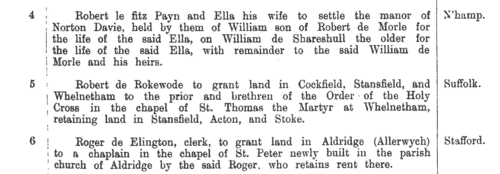
| Landowners and tenants in Shropshire
(1345-1485)
Inquisitions ad quod damnum were held by the appropriate sheriff or escheator (or other officer in whose bailiwick the matter in question might lie) to investigate cases in which the royal or public interest might be damaged by proposed alienation or settlement of land (especially alienation to religious uses, into mortmain). The key findings from these inquisitions were as to the tenure of the land and the service due from it; its yearly value; the lands remaining to the grantor, and whether they sufficed to discharge all duties and customs due from him; and whether he can still be put upon juries, assizes and recognitions, so that the country be not burdened by his withdrawal from them. Generally speaking, this process had the makings of a system of licensing such alienations, and raising money in proportion to the valuations. Equally, there are many items that deal with subjects such as the closing of public roads, the felling or inclosing of woods, or the proposed grant of liberties or immunities. A calendar of these inquisitions from the 19th year of the reign of king Edward III to the 2nd year of Richard III was prepared by the Public Record Office and published in 1906. We have now indexed this calendar by surname and county. Most of the individuals appearing in the calendar are either pious individuals seeking to make grants to religious bodies for the sake of their souls; or landowners securing the disposition and settling of their real estate. But some other names do appear - tenants, trustees, chaplains and clerks.PRIDE. Cost: £6.00.  | Sample scan, click to enlarge
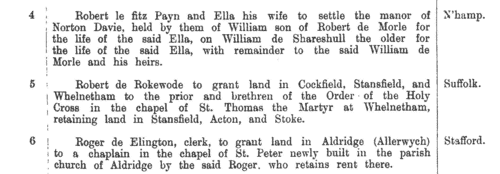
| Early records of Wells cathedral, in Somerset
(1001-1500)
Three early registers of the dean and chapter of Wells - the Liber Albus I (White Book; R I), Liber Albus II (R III), and Liber Ruber (Red Book; R II, section i) - were edited by W. H. B. Bird for the Historical Manuscripts Commissioners and published in 1907. These three books comprise, with some repetition, a cartulary of possessions of the cathedral, with grants of land dating back as early as the 8th century, well before the development of hereditary surnames in England; acts of the dean and chapter; and surveys of their estates, mostly in Somerset.PRIDE. Cost: £6.00.  | Sample scan, click to enlarge

| Militia in Whitley hundred, Somerset
(1569)
A muster of the ablemen, gunners, light horsemen, pikemen, archers and billmen available from this hundred, compiled by sir Hugh Paulet, sir Maurice Barkeley, sir Ralph Hopton and John Horner in answer to a royal commission of the 11th year of queen Elizabeth. The returns are arranged by tithing. The hundred consisted of the parishes of Ashcott, Blackford, Butleigh, Compton Dundon, Cossington, Gre(i)nton, High Ham, Holford, Holton, Middlezoy, Moorlinch, Othery, Milton Podimore, Shapwick, Street, Walton, West Monkton, Weston Zoyland, Wheathill and Woolavington, northeast of Bridgwater. (The sample shown is from the return for the borough of Axbridge)PRIDE. Cost: £6.00.  | Sample scan, click to enlarge
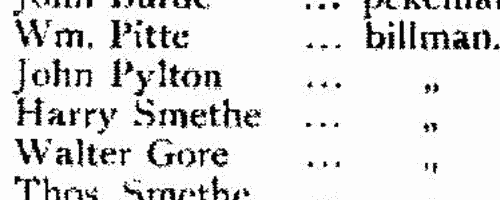
| Middlesex Sessions
(1549-1603)
This printed calendar collates a number of surviving records from Middlesex sessions for the period. Principally these are the Gaol Delivery Rolls (G. D. R.) and the General Sessions of the Peace Rolls (G. S. O. P. R.). Both series cover general criminal indictments (bills) together with the recognizances of the witnesses to attend; but the Gaol Delivery Rolls, by their very nature, tend to deal with the more serious cases - felonies where the accused could not be released on bail. The General Sessions rolls also include the sheriff's lists of bailiffs, sub-bailiffs, high and petty constables in the shire; writs of venire facias for production of jurors, writs of capias, lists of jurors, jury-panels &c. The Gaol Delivery Rolls also include coroners' inquests, writs of supersedeas, and memoranda of proclamations. Special inquiries are recorded in separate Sessions of Oyer and Terminer (S. O. T.) rolls and Inquest or Inquisition rolls (I. R.) Although coverage is good, none of the sequences of rolls for this period is complete. A peculiarity of this calendar is that in the case of actual incidents, the date given at the start of each entry is the date that the incident was alleged to have taken place (for instance, 1 June 11 Elizabeth (1569) in the sample scan) rather than the date of the court proceedings. PRIDE. Cost: £4.00.  | Sample scan, click to enlarge

| Inhabitants of Somerset
(1625-1639)
The Reverend E. H. Bates Harbin prepared extracts from the Somerset quarter session records of 1625 to 1639 for publication by the Somerset Record Society (xxiv) in 1908. The period is covered by quarter sessions minute book 2 (part) and 3; these are based on the rolls of recognizances; criminal indictments; and the sessions rolls (which also supplied a hiatus in book 2 for most of 1627). PRIDE. Cost: £4.00.  | Sample scan, click to enlarge
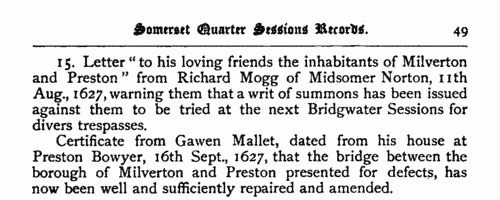
| Southwell Peculiar Baptisms, Marriages and Burials
(1614-1641)
Each year a copy of the previous year's register of baptisms, marriages and burials, attested by the incumbent and churchwardens, was returned to the diocesan authorities. The peculiar of Southwell in Nottinghamshire was ordinarily exempt from episcopal jurisdiction in such matters, and the 24 parishes in the peculiar made similar returns to the Southwell registry. A few of these survive from this period, and they were transcribed by T. N. Blagg and printed as the first volume of the Record Series of the Thoroton Society in 1903. The returns are for Beckingham 1634, 1637, 1641; Bleasby 1633; Blidworth 1638; Calverton 1617, 1623; *Caunton 1614, 1619, 1628, 1641; Cropwell Bishop 1638, 164; Darlton 1622, 1633, 1641; *Dunham 1641; Edingley 1638; Farnsfield 1623; Halam 1622, 1637; Halloughton 1622, 1637; *Holme 1623, 1625, 1627, 1638, 1641; Kirklington 1622, 1638; *Morton 1622, 1623; *North Muskham 1623, 1633, 1638; South Muskham 1623; *Norwell 1638, 1641; Oxton 1622; *Ragnall 1623; Southwell 1633, 1640; Tithby (cum Cropwell Butler) 1625; Upton 1633, 1638; and Woodborough 1623, 1627, 1637, 1638 and 1640. Parishes marked with an asterisk (*) are those for which the original registers were missing for the period covered by the transcripts.PRIDE. Cost: £4.00.  | Sample scan, click to enlarge
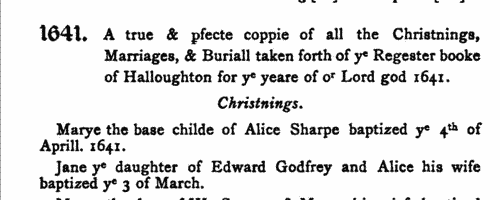
| PCC Probates and Administrations
(1645)
The Prerogative Court of Canterbury's main jurisdiction was central and southern England and Wales, as well as over sailors &c dying abroad: these brief abstracts, compiled under the title "Year Books of Probates", and printed in 1906, usually give address, date of probate and name of executor or administrator. They are based on the Probate Act Books, cross-checked with the original wills, from which additional details are, occasionally, added. The original spelling of surnames was retained, but christian and place names have been modernised where necessary.PRIDE. Cost: £2.00.  | Sample scan, click to enlarge
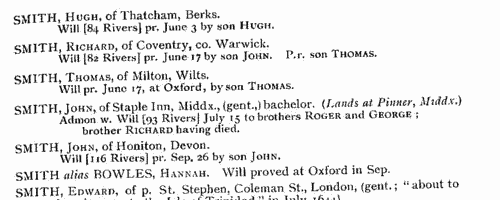
|
Research your ancestry, family history, genealogy and one-name study by direct access to original records and archives indexed by surname.
|












